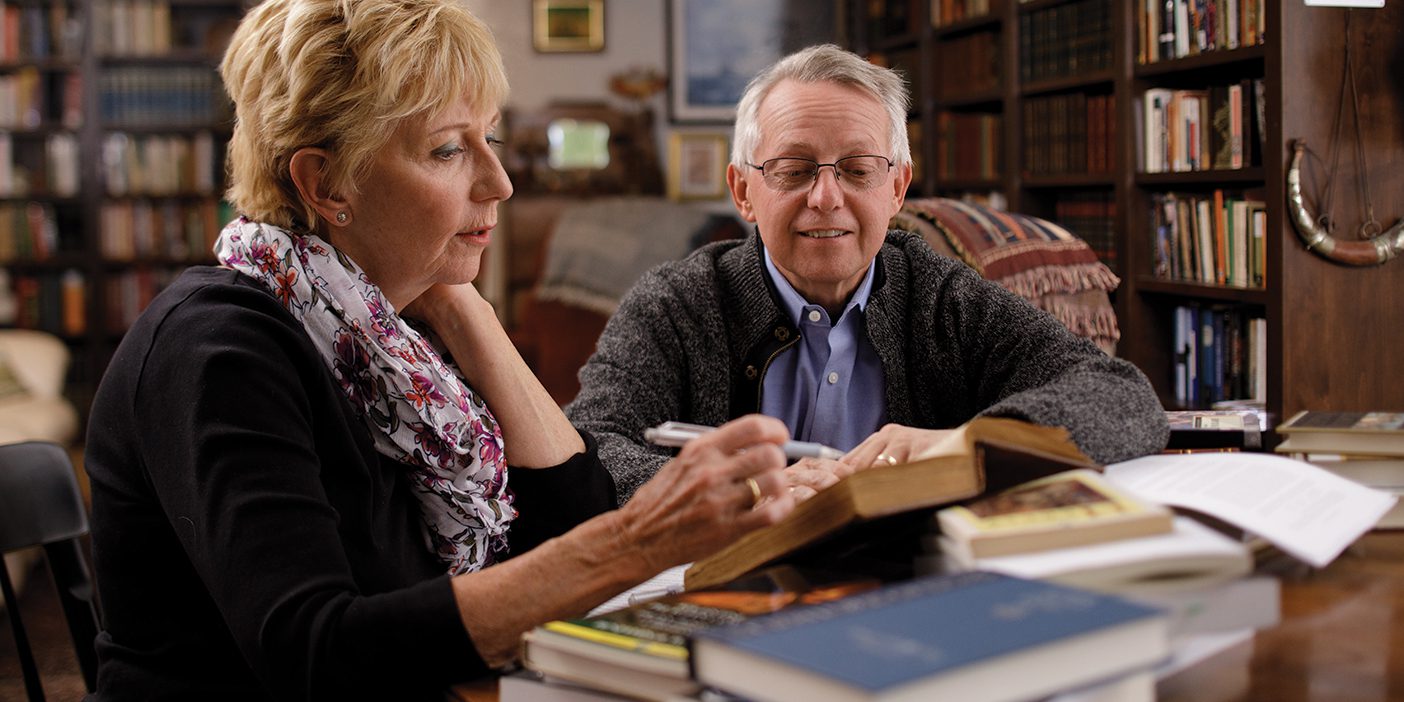
How much do authors Terryl and Fiona Givens (above) love literature? Just step into their home library and see. To their collection of thousands of volumes stacked in floor-to-ceiling bookcases, “we probably add more than a book a day,” Terryl says.
They regularly come in handy. Since 2019 both Givenses have worked with the Neal A. Maxwell Institute for Religious Scholarship, where Terryl is a senior research fellow. They’ve written about theology in their books The Crucible of Doubt, The God Who Weeps, and The Christ Who Heals. Their latest book-in-progress focuses on inspiring words of holy men and women across history—writings that occupy an entire bookcase in their library.
“The Doctrine and Covenants defines scripture as that which is spoken under the influence of the Holy Ghost,” says Terryl. “Fiona and I have had the experience of reading works we feel are every bit as inspired as our own scriptures.”
Here the Givenses share five of their favorite religious authors outside of the tradition of The Church of Jesus Christ of Latter-day Saints.
1. Julian of Norwich
After a series of visions of Jesus Christ, 14th-century English nun Julian spent the ensuing 20 years writing about those experiences. “No greater exposition of God’s love exists in the English language,” says Terryl.
Where to Start: The Showings (or Revelations)
A Word of Wisdom: “No being can know how much and how sweetly and how tenderly the Creator loves us.”
2. Thomas Traherne
Thomas Traherne was an obscure 17th-century English poet whose works have only recently been discovered and published. “I think he was the holiest, most childlike disciple who ever lived,” says Terryl.
Where to Start: Centuries of Meditation
A Word of Wisdom: “No man that clearly seeth God’s face, can when he sees it clearly, willingly and wittingly forsake Him.”
3. William Law
William Law forfeited his opportunity to serve as a minister of the 18th-century Church of England when he refused to swear allegiance to King George I.
Where to Start: A Serious Call to a Devout and Holy Life
A Word of Wisdom:“I am incapable of thinking otherwise of God than as the one . . . who can will nothing else and blessing, and happiness, and perfection to every life.”
4. Edward Beecher
The 19th-century American minister Edward Beecher wrote on two beliefs also treasured premortal spirits and that Heavenly Father suffers when His children suffer.
Where to Start: Concord of Ages and Conflict of Ages
A Word of Wisdom: “Of all errors, none are so fundamental and so wide reaching in their evil tendencies and results as errors with respect to the character of God.”
5. Dietrich Bonhoeffer
German minister Dietrich Bonhoeffer fearlessly defended Christianity during WWII and was executed by the Nazi regime. “His works are beautiful and gentle,” says Fiona. “He really expands on the idea of God being vulnerable because of His love for us.””
Where to Start: Letters from Prison and The Cost of Discipleship
A Word of Wisdom: “It is only because [God] became like us that we can become like him.”
6. Irenaeus
Irenaeus was a second-century father who wrote about the potential to become like God and the educative purpose behind life.
Where to Start: Against Heresies
A Word of Wisdom:“Jesus Christ . . . did, through his transcendent love, become what we are, that he might bring us to be what he is himself.”
7. Origen
Third-century father Origen, largely influenced by Irenaeus, wrote about many doctrines closely related to what Latter-day Saints understand as the plan of salvation. “He defended pre-existence, the necessity for a fall, eternal progress, a separate and distinct Father and Son, and many other doctrines that would be abandoned by the mainstream church,” says Terryl.
Where to Start: First Principles
A Word of Wisdom: “The Father, too, himself, the God of the universe, ‘patient and abounding in mercy’ and compassionate, does He not in some way suffer? Or do you not know that when He directs human affairs, He suffers human suffering?”
8. George Herbert
George Herbert was a clergyman and poet who lived during the time of Shakespeare. Terryl argues that he is “perhaps the greatest writer of religious poetry in the English language.”
Where to Start: The Temple
A Word of Wisdom: “The God of love my shepherd is, / And he that doth me feed: / While he is mine, and I am his, / What can I want or need?”
9. Emanuel Swedenborg
During the Age of Enlightenment, Swedish mystic Emmanuel Swedenborg explored the concepts of a spirit world, eternal marriage, and eternal progress.
Where to Start: Heaven or Hell
A Word of Wisdom: “The nature of heaven is to provide a place there for all who lead good lives, no matter what their religion may be.”
10. George Macdonald
Scottish minister George Macdonald was a principal influence for C. S. Lewis “He wrote highly accessible sermons of eloquence and beauty,” says Terryl.
Where to Start: Unspoken Sermons
A Word of Wisdom: “If we will but let our God and Father work His will with us, there can be no limit to His enlargement of our existence.”
11. Richard Rohr
Richard Rohr is a 21st-century Catholic father and writer of meditations and devotions.
Where to Start: Falling Upward: A Spirituality for the Two Halves of Life
A Word of Wisdom: “Life is all about practicing for heaven.”
12. N. T. Wright
N.T. Wright, a 21st-century English bishop, is a prolific biblical scholar whose writings focus on “our responsibility to create heaven on earth, rather than pursue personal salvation in heaven,” says Terryl.
Where to Start: Surprised by Hope and Simply Christian
A Word of Wisdom: “The Father, too, himself, the God of the universe, ‘patient and abounding in mercy’ and compassionate, does He not in some way suffer? Or do you not know that when He directs human affairs, He suffers human suffering?”












